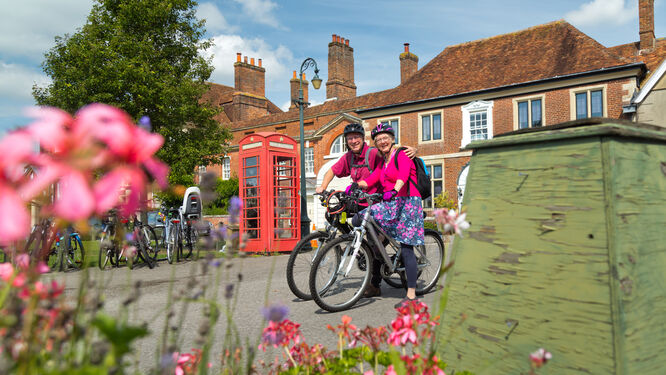10 Tips for Environmentally Friendly Travel in Europe
By Rick Steves
With every visit to Europe, I'm inspired by the way Europeans recognize human-created climate change not as a "theory" — they accept it as a reality — and take meaningful action to address it.
In England's Portsmouth, floodgates are being built on medieval streets that never needed them before. The Swiss (who don't build ski lifts these days without outfitting them with plumbing to make snow) remember summer skiing in the Alps as something their parents did. And the Dutch — famously smart, famously frugal, and famously below sea level — are spending billions of euros to shore up their dikes and prepare for a rising sea.
Europe, long ahead of the curve environmentally, already legislates in a way that minimizes its carbon footprint. In various parts of Europe, high-speed (and energy-efficient) trains have replaced long drives and polluting flights, wind farms dot the landscape, industries are held to rigid emissions standards, and entire communities are competing to become fully self-sustaining.

As travelers — who burn fossil fuels with every intercontinental flight and bus tour — we need to do our part to address climate change, too. Here are 10 simple tips for curbing your carbon footprint when traveling:
- Make sure your home isn't bleeding energy while you're away — turn down the thermostat, unplug as many appliances as you can, and suspend print subscriptions.
- When possible, travel by train — rail travel is very energy efficient. And in Europe it's also generally fast, easy, and comfortable.
- If you rent a car, rent the most fuel-efficient option, and decline any free "upgrade" to a model that's bigger than you need.
- In cities, enjoy the thrill of getting around by bike if you can, and take advantage of Europe's fantastic public transportation rather than relying on taxis. (And remember that Europe's airports are all well-served by easy, frequent transit.) Before taking a bus tour, look into a bike or walking tour instead.
- Be conscious of your energy consumption in hotels. Turn off the lights and air-conditioning when you leave the room. (Many European hotel rooms help you do this already: The power turns on only when the key is in a slot.) On warm days, close the window shutters or curtains before you leave in the morning, and you won't need to blast the air-con when you return. Because room service generates needless laundry, I hang the "Do not disturb" sign on my door and reuse my towel.
- Most of Europe is flowing with great tap water, often available in fountains around towns and cities. By reusing a plastic water bottle or bringing your own refillable water bottle, you not only save money, but also avoid consuming bunches of plastic and reduce demand for water that's shipped overland in trucks and trains.
- Cut down on other wasteful consumption as much as possible. Travel habits prompt many of us to use disposable items much more often than we do at home, but you can reduce this with a little prep: Pack a lightweight shopping bag and keep it in your day bag, and bring a set of reusable picnic ware. Don't pick up brochures, maps, or other materials that you don't need to keep — consider taking photos of them instead. (The fewer brochures that get picked up at tourist offices, the fewer they'll print next year.) Avoid using the individually packaged, itsy-bitsy toiletries supplied by hotel rooms. A single bar of soap and squeeze bottle of shampoo from home can last an entire trip.
- Eat locally: Food that hasn't been trucked long distances is easier on the environment (and tastier). Picnic shop at farmers markets when you can, and avoid chain restaurants. Look for restaurants that use mainly local and organic ingredients (more likely with smaller family-run places; "bio" is shorthand for "organic" in many European languages).
- Patronize hotels and travel companies that promote and practice sustainable traveling practices.
- Notice how Europeans seem to live more while consuming less, and how they live as if their choices can shape a better future. And take home a little of that sensibility as a souvenir.
This is just a start. There's plenty more that can be done to compensate for the environmental costs of international travel. But even in small ways, we can make a difference. That's why my tour company is dedicated to our Climate Smart Commitment, designed to account for our tour members' carbon footprint.
By traveling as greenly as possible now, we help ensure happy travels for future generations.

